Argentina 11
Argentine solidarity in defense of Cuba

Argentine solidarity prevents action against Cuban embassy in that country (+ Video)
October 13, 2021
Translated and edited by Walter Lippmann for CubaNews.
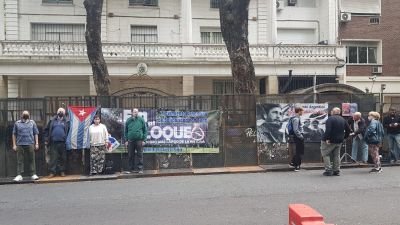
Last Monday, October 11, from the most recalcitrant of the Argentine right wing and the small group of Cubans residing in the country who adhere to the so-called Patria y Vida (Homeland and Life), an attempt at an attempted attack was organized against the Cuban diplomatic delegation in Buenos Aires.
In the face of the attempt by a gusano-Cuban group financed by CADAL, Center for the Opening and Development of Latin America, an Argentine anti-communist NGO linked to the US State Department, the CIA and USAID, the MAS Cuba, Argentine Movement of Solidarity with Cuba, immediately mobilized and occupied the front of the Embassy, preventing the action, which included throwing eggs against the front of the building.
The tiny anti-revolutionary group had the support of the right-wing faction of the Libertarian Party, which openly adheres to the policies of Bolsonaro in Brazil and VOX in Spain, and tries, with violent actions and speeches, to capture the most dissatisfied sector of society, reproducing those policies in our country, which only benefit Washington’s recolonizing project.
#CubaNoEstaSola, those in solidarity with the Cuban Revolution, with their quick call, did not allow an attack on the diplomatic representation of Cuba in Argentina.
In video, solidarity prevents attack on Cuban Embassy in Argentina:
Argentina in the year of the pandemic

Argentina in the year of the pandemic
As everywhere else, the arrival of SarsCoV-2 has hindered Peronist management in its return; but this has not hindered a social task that has struggled to impose itself on the economic ballast during its first year in office
 Author: Marina Menéndez Quintero | marina@juventudrebelde.cu
Author: Marina Menéndez Quintero | marina@juventudrebelde.cu
December 12, 2020
Translated and edited by Walter Lippmann for CubaNews.
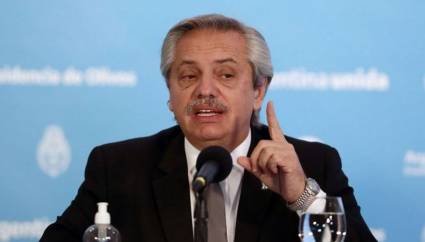
Alberto Fernandez believes he will be able to raise Argentina again, as he did in 2003 when he was Nestor Kirchner’s right-hand man. Author: Getty Images Published: 12/12/2020 | 08:21 pm
The debates to legalize the voluntary termination of pregnancy close the legislative year and, also, the list of relevant events noted in Argentina during the first 12 months of the Peronistas return. But the events that will most mark the life of the nation are in the economy and in society itself, at the mercy of both, like everything in this world, of the scourge and the confrontation of the pandemic.
The interruption of the pregnancy will be the last vote that the Senate will take on the 29th of this month after its approval in the House of Representatives, which could lead, if it is approved, to the fulfillment of one of the most important campaign promises of the executive that Alberto Fernandez presides over.
And although the issue is attracting the attention of defenders and detractors, it is discussing spaces in the media with the arrival, in the first two months of 2021, of ten million doses of the vaccine against Covid-19. This was negotiated with Russia through the direct intermediary of President Vladimir Putin to help a country that is accumulating more than 40,000 deaths from Sars-Cov-2, despite the efforts of the government in the care of the disease and the sick.
It could be said that the outbreak of the pandemic in March, barely three months after the arrival of the Front of All to power, has passed through his presidential administration at the beginning, to the point that the Head of State has declared that when history is written he will be remembered as “the president of the pandemic”.
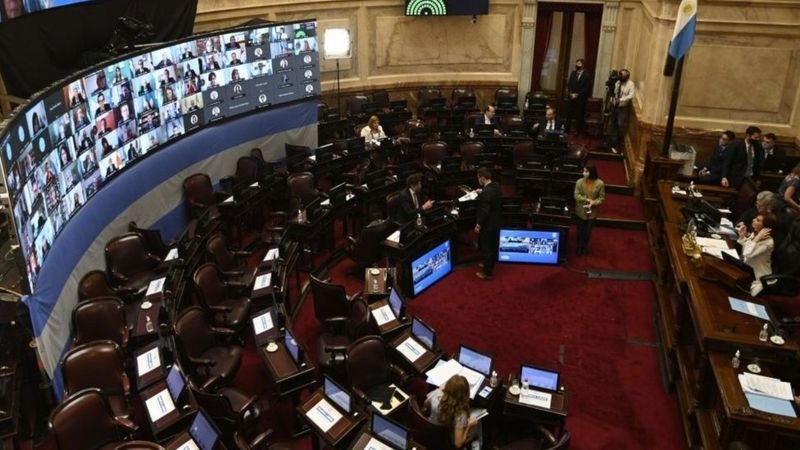
The Argentine Senate also approved the Law of Solidarity and Extraordinary Contribution to Covid-19. Getty Images
Confronting the coronavirus has been much more difficult for a nation that was left, as Argentines often say, “in intensive care” by Mauricio Macri’s terms and was therefore in a worse position to face a crisis that has continued to rage.
In October 2019, still in the middle of Macri’s administration, the official National Institute of Statistics and Census (Indec) reported that poverty had risen to 35.4 percent and destitution to 7.7 percent.
That was the scenario where the restrictions imposed against the risk of contagion were primed, so that at the end of the first half of 2020, Indec reported another slight rise in poverty by five percentage points to 40 percent. Meanwhile, the price of the basic basket rose by 20 percent: nine percent more than the increase in total family income which grew by 11 points, so that families living standards continued to decline .
The substratum was visible in the macro numbers left by Macri. At the end of his two terms, inflation had escalated from 25 to 50 percent annually, the accumulated peso devaluation was 540 percent, reserves had become thinner and, worst of all, the foreign debt was equivalent to 95 percent of the GDP in a country that was not growing.
Argentina was in virtual default.
Faced with this reality, the impact of what was the biggest challenge and now also the biggest success of the new government is not yet visible: the renegotiation of 99 percent of the debt bonds held by private holders, an agreement that saved the country from default and set sail so that, despite everything, the ship would sail again.
The rescheduling of payments – as the young and talented Minister of Economy, Martín Guzmán, is accustomed to say, because only the terms have been distanced but Argentina will pay – was completed in September and, although it may have passed by in the midst of the contingencies unleashed by the Covid-19, it can be considered transcendental. Paying interest on the debt, it was impossible to think of any plan for national revitalization.
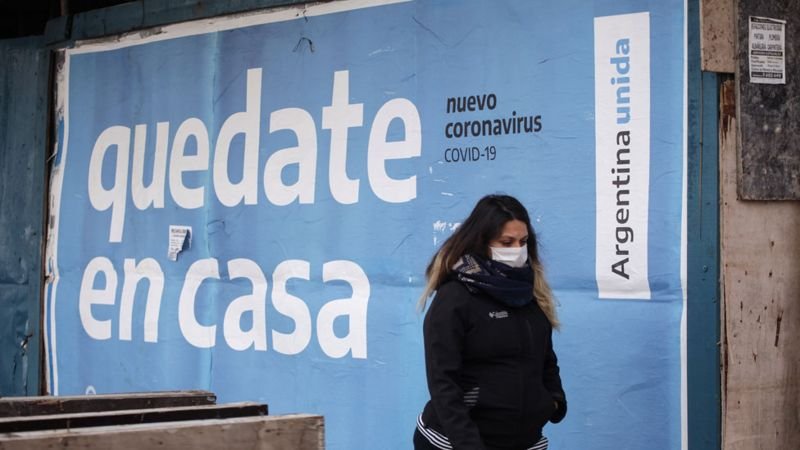
The arrival of the coronavirus added to other problems already facing Argentines. Photo: Getty Images
The payment of $66,137 million dollars of debt under foreign legislation in ten years was restructured with a deduction of around 60 percent, so that only the debts agreed to with the International Monetary Fund itself, relatively “comprehensive” now but responsible for an unpublished disbursement approved by Macri of 57 billion dollars, of which $44 billion were received. Despite its cooperation in the process with the bondholders, the Fund will try to negotiate with the government by imposing prescription books that the Argentine executive does not want to accept.
The successful negotiation with the private sector made it possible for the legislature to approve last month an ambitious and optimistic budget for 2021 that contemplates the forecast of 5.5 percent economic growth after the 12.1 percent collapse of the year that ends,. Inflation is projected to decelerate from 32 percent reported this year, to 29%; and a primary deficit of 4.5 percent, among other aspects.
Martin Guzman, who is responsible for the plan already approved by Congress, has said that this will be one of the elements he would use to negotiate a new program of extended facilities with the IMF.
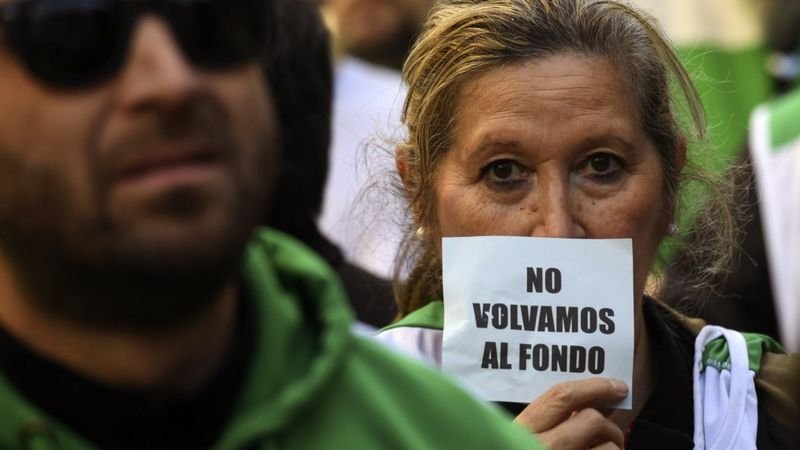
The interventions of the IMF in Argentina have been popular rejected. Photo: AFP
Offering the shoulder to the people
But the benefit that some of this brings is not yet visible today, when the adversity of the economic figures has been lessened by the government with social measures, aimed at making the burden on the people less heavy.
This shouldering of the burden must be responsible for the fact that, in spite of the sorrows, the executive headed by Alberto and former President Cristina Fernández closed the year with popularity ratings that give more than 50 percent support to the president.
A neoliberal ideologue bent on discrediting him would call it “populism”; but such thinking about people is precisely what offers the nuances that differentiate the models from the socio-political point of view.
Among these measures is the Law of Solidarity and Productive Reactivation, which suspended the formula for adjusting pensions and retirement pensions, and promoted their stability. Also, there is the increase of withholding taxes on exports, the freezing of public service rates throughout the year, the creation of the so-called PAIS Tax on purchases with dollars in order to increase savings, and the increase of taxes only on those who receive more income.
In addition, steps were taken to strengthen local production chains in order to make products cheaper, and it was decided to create a food card that will monitor the nutritional quality of families.
Interviewed by the alternative media El Destape, Alberto Fernandez has confessed the rigors of governing a country that received in crisis and then has vilified the coronavirus. But he has also shown that he feels at ease.
During the last three months, income has exceeded inflation by almost three points, he said. Industries such as the automotive industry produced 20 percent more in November than in the same month last year, and reports state that “in the most popular neighborhoods, where people need it most, demand in the dining halls has fallen,” he said.
“So I say, I was not wrong.
Argentina: Fidel’s Last Trip Abroad

Argentina: Fidel’s Last Trip Abroad
By Orestes Pérez Pérez
August 12, 2020
Translated and edited by Walter Lippmann for CubaNews.
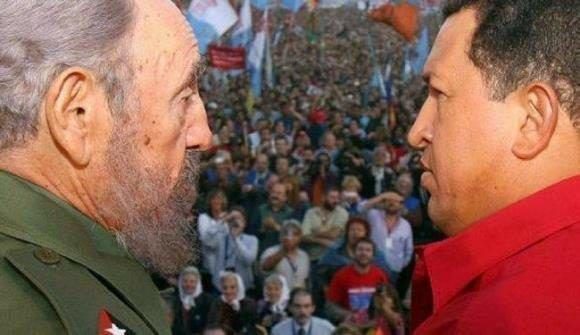
Fidel and Chavez in a massive act in Argentina. Photo|> Archive
On four occasions, Commander-in-Chief Fidel Castro Ruz was in Argentina. His last trip abroad was precisely to that country, on the occasion of a Summit of Mercosur Presidents, held in the city of Córdoba, in July 2006.
Wearing his inseparable olive green uniform and almost without warning, Fidel arrived at the Ingeniero “Ambrosio Taravella” International Airport in Córdoba at around 8:30 pm on Thursday, July 20, 2006, where he was received by then President Néstor Kirchner.
Some witnesses tell of that historic visit, that until the last moment there was no news of the Cuban president’s arrival, which took place amidst the strictest security measures.
“This must be the only meeting in which I was not made a plan of attack. I had to disinform even my friends. I don’t think anyone knew if I was coming, not even me”, he commented in a speech delivered at the so-called “Summit of the Peoples”, on a cold night, typical of these southern winter months, at the University of Cordoba, the same one that was the scene of the remarkable University Reform of 1918, more than 100 years ago.
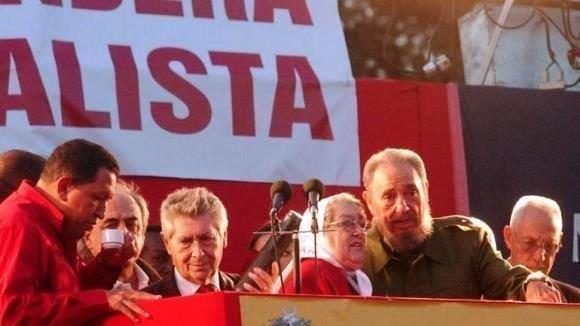
Fidel at the popular event in Cordoba with Hebe de Bonaffini. Photo> Archive
“You made a reform that made history, which was the most important, I am about to say the only one. But time has passed, and the world study system must be reformed,” said the Historical Leader of the Cuban Revolution, who was accompanied that night by Hugo Chávez and Hebe de Bonafini, head of the Mothers of Plaza de Mayo, the group that organized the event.
Thousands of people from Cordoba and other provinces of the country listened attentively to Fidel, who spoke with them for three hours about the most varied issues, including the urgent need for Latin American and Caribbean integration, social programs in Cuba, public education and the literacy campaign of the first years of the Revolution, among others.
Chavez, for his part, had promised to be brief. “I told Fidel, I’m just going to be his host,” he said to the crowd that applauded him and repeated his last name over and over again. Nevertheless, he reflected for several hours on the “Cordobazo”, the challenges of Mercosur and American imperialism. “Only the people make history,” he said that night in Cordoba.
The Commander-in-Chief had been in Argentina on three previous occasions: in 1959, invited by then-President Arturo Frondizi, at the Ibero-American Summit (1995) and in 2003, when he attended Kirchner’s inauguration, when he delivered his memorable speech on the steps of the Law School of the University of Buenos Aires (UBA), before around 30 thousand people.
In this last trip Fidel visited -together with Chávez- the house where Che lived in Alta Gracia, where they shared anecdotes of the Heroic Guerrilla’s childhood and got to know closely the spaces he lived in during his childhood.
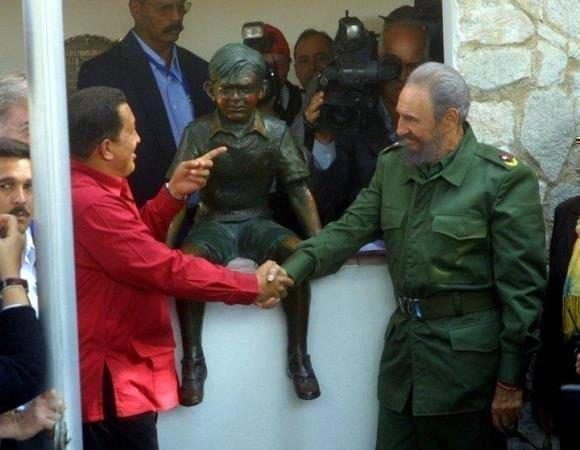
Fidel and Chavez at the Che house in Alta Gracia. Photo> Archive
The peaceful mountain village, which enjoyed a sunny and somewhat hot day, unusual for the season, saw its usual mid-afternoon rest interrupted by the unexpected visit.
Since very early in the morning, that July 22nd, the people from Alta Gracia took over the streets of this mountain village, with 45 thousand inhabitants, 35 kilometers away from the capital of Córdoba, to take pictures, hug or -simply- shake hands with these two world leaders.
A sea of people, all surprised and incredulous, shouted and applauded the presence of Fidel and Chávez. For them, it was the most transcendental event in the history of that small town. For Fidel, perhaps without knowing it, his last trip abroad.
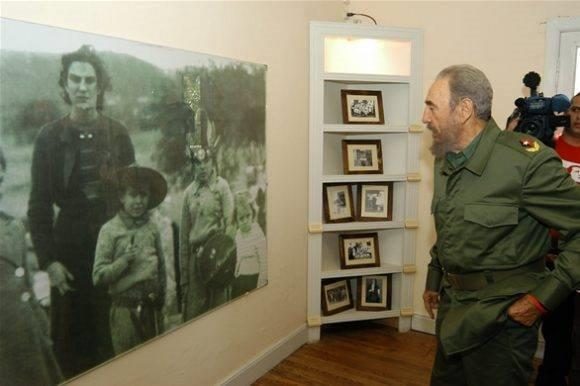
Fidel and Chavez at the Che house in Cordoba. Photo> Archive
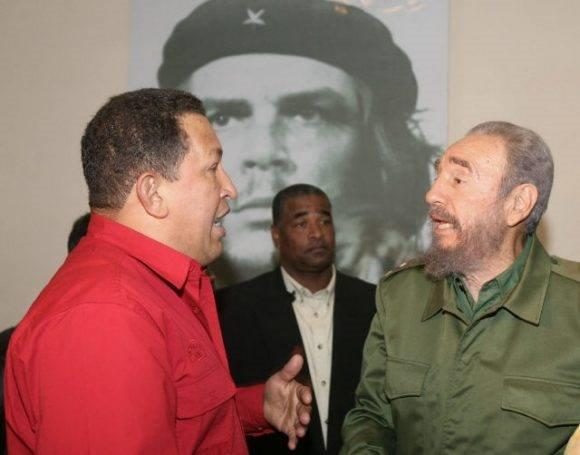
Fidel and Chavez at the Che house in Cordoba. Photo> Archive
CFK and Florencia Fly to Argentina

Cristina Fernández de Kirchner and Her Daughter Florencia Fly from Cuba to Argentina
In her text, Cristina Fernández de Kirchner also recommends that Argentines respect preventive isolation within the framework of the fight against the coronavirus pandemic
By Redacción Digital
March 20, 2020
Translated and edited by Walter Lippmann for CubaNews.

Photo: Taken from the Internet
Vice President Cristina Fernández de Kirchner announced that she is returning to Argentina from Havana, Cuba, with her daughter Florencia Kirchner. The decision was made public by the former president herself through her Twitter account. There, in a tweet, she states that her daughter and her doctors “managed to restore some of her lost health and have been working on her return home for some time.”
In her text, she also recommends that Argentines respect the preventive isolation in the framework of the fight against the coronavirus pandemic.
The return will take place through a flight from Cubana de Aviación, the island’s flagship carrier. Although Cuba is not a country at risk from the coronavirus, the former president said that, together with her daughter, they will comply with the preventive isolation.
This is her tenth trip so far this year, and for the former president, this is the most important one. “Flor asked me to come and help her… I felt that I could not do it alone,” wrote CFK.
In her tweets, the former president deeply thanks the people and government of Cuba. “And I feel that even if I had a hundred lives, they would not be enough for me to express my gratitude to this Cuba of solidarity, punished by the powerful but dignified and haughty,” writes the vice president and continues: “Cuba stood by me at a very difficult time in my life, that held out its hand to my daughter without speculation and that cared for and protected her when the fierce media and judicial persecution severely damaged her health.
Regarding Cuba, the former president also points out that “that Cuban doctors exercise their vocation with commitment, with a profoundly humanist stance and who, with precise diagnosis, for the first time, gave Flor the tools that those who have lost their health need”.
Finally, the Vice President asked Argentines to take care of themselves in the face of the coronavirus pandemic: “I would like to ask you to do the same, to take care of yourselves and others by respecting preventive isolation in your homes. I love you all very much”.
Cristina Spoke About “Sincerely”

Cristina Spoke About “Sincerely” at the Havana Book Fair
Díaz-Canel joined the Argentine Vice President during the presentation of her book in Havana
By Marina Menéndez Quintero
February 8, 2020
Translated and edited by Walter Lippmann for CubaNews.
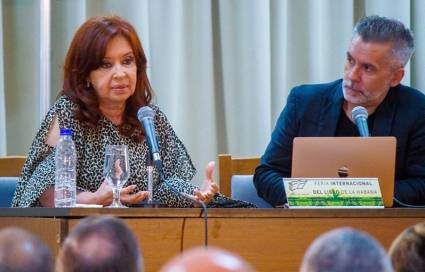
The presentation of Sincerely in Havana is the first that Cristina Fernandez has made outside of her country, and also the first in her capacity as Vice President Author: Maykel Espinosa Rodriguez Published: 08/02/2020 | 09:17 pm
A “crowd” of Argentines had been chanting for a few minutes: “Ya volvió, ya volvió” (He’s back, he’s back), among other songs, when one of Cristina Fernández’s compatriots suggested: “Uno cubano, uno cubano” (One Cuban, one Cuban). Then we heard: “Pa’ lo que sea, Cristina; pa’ lo que sea!” (Whatver you want, Cristina. Whatever you want!”)
Shortly thereafter, the former president and current vice president of Argentina burst into the crowded Nicolás Guillén hall of the Morro-Cabaña Complex, accompanied by the Cuban president, Miguel Díaz-Canel Bermúdez.
The preamble to a meeting that went beyond the mere formal presentation of a book could not be different, because Sincerely – her first volume of this type, and the one that precedes it with three others that compile speeches and texts – is much more than a strictly literary event and also constitutes, as the presenter Marcelo Figueras, an Argentine journalist, commented, a “political phenomenon”.
The text -a bestseller since its presentation in Argentina last April, welcomed with anticipatory warmth, the electoral results that would follow- was started by Cristina on the eve of the electoral transfer to Mauricio Macri, as she wanted to tell what had happened to her and to Argentina after that day.
She finished it in Cuba, where she finished writing the last chapter, started in the dining room of her house before coming to visit her daughter Florencia -sick from stress and cared for here, in March 2019-, which turned out to be, in the end, the first chapter of a book that, she clarified, is not an autobiography.
Combative as the passages that the author narrates and the greetings that she received were Cristina’s comments – although casual and often humorous – during the evening, led by colleague Marcelo with that professionalism shown when he asked the Vice President almost everything that each of the attendees would have liked to know.
In the case of the years of “Macri-ism”, they could not be left out of the book or the notes with which she explained its content, phenomena such as lawfare or the judicialization of politics, which she described as a special chapter of Latin America, but which acquired in Argentina a mafia and anti-family component, with the purpose of stigmatizing it.
It was no longer necessary to “disappear”, as the military did during the dictatorship against “dissident militants” of Latin American governments. This was replaced by media suppression through stigmatization, he explained.
In Argentina, after that dictatorship that began in 1976, a financial model came into place that indebted the country by more than ten billion dollars a year and tied it to the International Monetary Fund (IMF) until the arrival of Néstor Kirchner to the presidency, the development of an industrialization model and the payment that de-indebted the nation. For the first time Argentina, he noted, was not subject to IMF conditionality.
But with Macri came another period of indebtedness amounting to $30 billion per year, which left Argentina receiving the new administration with a debt of $44 billion to the IMF. “That was not by chance”, he said.
Cristina beieves that this should be a turning point and that the sovereign debt should be investigated, as a way to prevent the cycle from repeating itself, independently of the debt restructuring process initiated by the government of which it is part. “A point must be made. Never again,” he said.
She reaffirmed the position of the Frente de Todos and Alberto Fernández since the electoral campaign. You can’t pay if the country can’t grow economically, and you can’t grow if you don’t inject investment into the economy. The first thing we have to do to pay is to get out of the recession, he said.
Cristina Fernández gave a masterly lecture. And she gave it as she wrote: Sincerely.
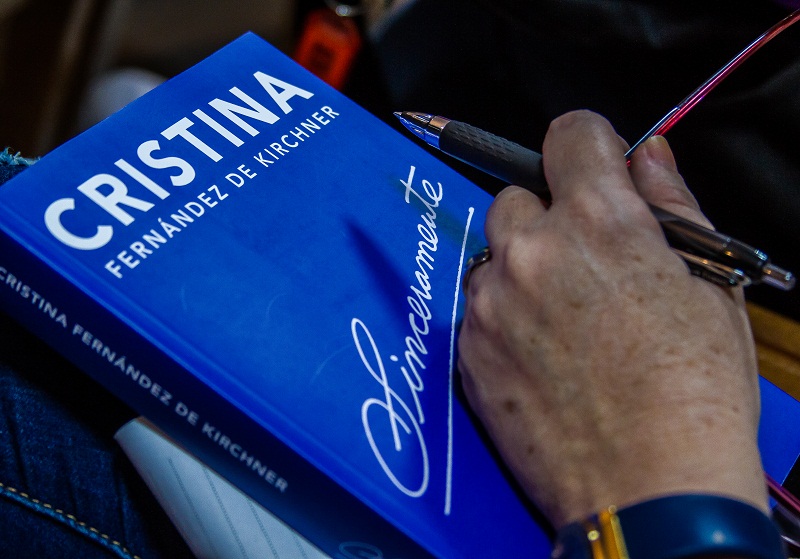
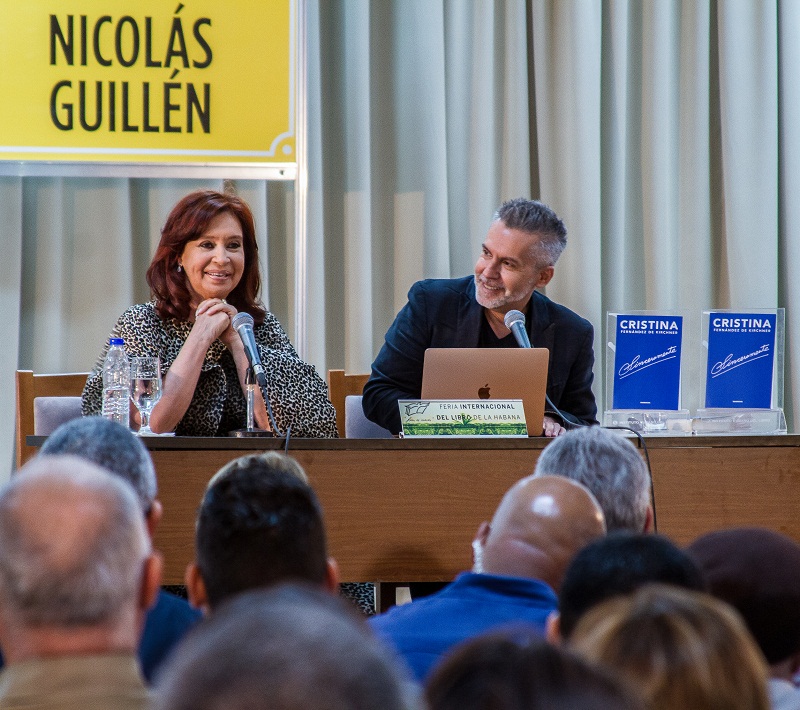
Cristina thanked the medical attention received in Cuba by her daughter Florencia, and had words of recognition for the health professionals of the Island. Photo: Maykel Espinosa Rodríguez
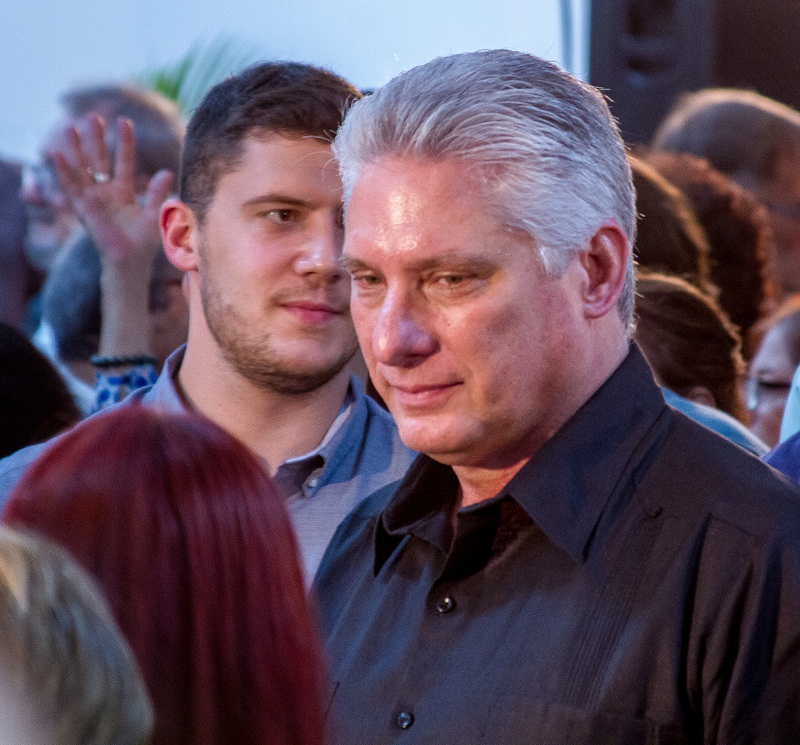
The President of Cuba, Miguel Díaz-Canel, attended the interesting evening together with intellectuals and the general public of the Island, as well as Argentinean visitors to the Fair. Photo: Maykel Espinosa Rodríguez
FULL VIDEO
Argentina Says “Never Again” to Foreign Debt

Argentina Says “Never Again” to Foreign Debt
That seems to be the feeling when the government takes a defining step: restructuring the debt burden that binds it to the IMF and private creditors
Published: Saturday 01 February 2020 | 08:58:50 pm.
By Marina Menéndez Quintero
Translated and edited by Walter Lippmann for CubaNews.
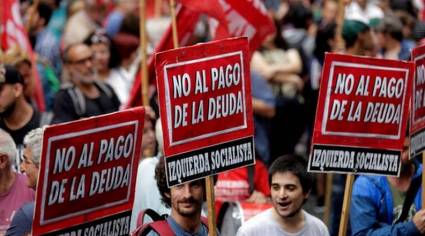 With the certainty that reason instills, the new Argentine government has already stood on its feet and is preparing to take the first and most important step of the beginning of its term, from which everything can be defined.
With the certainty that reason instills, the new Argentine government has already stood on its feet and is preparing to take the first and most important step of the beginning of its term, from which everything can be defined.
The renegotiation of the foreign debt in which Mauricio Macri’s government was trapped is essential to achieve the goals that the Frente de Todos wants to achieve in Argentina.
The urgency is understood in a simple way, and not only because the term will last only four years. It is not possible to walk around while a bundle of more than 280 billion dollars owed to private holders and the International Monetary Fund (IMF) is being dragged along. This is not only because the bundle of bills weighs too much: if each disbursement is not made within the established time frame, the country would be declared in default -that is, in cessation of payment- and then the world would indeed cut off the Argentines’ water and electricity.
The official start to get “relief” has been the first meeting of the young Minister of Economy, Martín Guzmán, with the private creditors; a meeting that took place this week at the Council of America in New York, and from which not all the businessmen came out very happy, according to certain sources that, perhaps, want to see things only from the dark side.
The headline, said the complainants, did not provide details of the “offer” to renegotiate, let alone the fiscal plan to be implemented by the Argentine government. Do businessmen have to control what the executive will do?
In any case, Guzmán had already given the details before leaving for the meeting. They are the same ones that President Alberto Fernández announced when he was still a candidate.
At that time, the president warned that, from now on, he would not borrow another dollar. And that, before paying, the first thing would be to resume growth.
At this point, it is clear that what Argentina is seeking is to “re-profile” the payment schedule, a term used to replace the familiar word “renegotiation,” and that it has different conceptual nuances because the nation does not aspire to “quitas,” that is, to a reduction in the nominal value of debts. What is sought is a restructuring -another current definition- that allows for the postponement of maturity dates.
The position is one of unquestionable technical reasoning: how to pay if the country does not produce, perhaps by asking for more debt, as Mauricio Macri did?
But Fernandez’s path, which Guzman follows, also carries with it a sense of national sovereignty that cannot be ignored if the economy and the country are to be brought to fruition.
“The economic program was designed and executed by us (…) What is ours is ours,” said Martín Guzmán before leaving for the United States, when asked about the expected negotiations with the Fund.
The security with which the holder conducts himself is not surprising. First, because it has been the international financial institution’s conditioning – in exchange for the credits granted to Macri – that has caused things to be the way they are again: unemployment triggered by state layoffs and the bankruptcy of small and medium-sized companies, a slowed-down economy, less purchasing power that made food shortages and in some cases hunger resurface, pension cuts, job insecurity, rising gas and electricity prices, and a long list of other similar things everywhere this neo-liberalism is applied in blood and fire.
Secondly, because Guzmán is not an upstart. He has worked for several years alongside the Nobel Prize winner in economics, Joseph Stiglitz, and has become an expert precisely on the issues surrounding sovereign debt.
“He is the right man at the right time (…) A brilliant and knowledgeable economist who can combine youthful vigor with experience beyond his 37 years,” Stiglitz said at the time.
On the other hand, prestigious economists who look at things from a more political angle and located in the Third World, such as the Belgian Eric Toussaint, say that Alberto Fernandez’s executive has all the arguments not to pay, because the Fund violated its own technical requirements by negotiating with Mauricio Macri the delivery of the largest credit that the institution has ever approved ($ 57 billion), even knowing that, even then, Argentina had no possibility of paying it back.
Some consider that the IMF followed Donald Trump’s instructions to support Macri; but others consider that the purpose was to tie Argentina back to the International Monetary Fund, as it was from the mid-1980s until the recovery achieved with Néstor Kirchner as of 2003, after the renegotiation of the debt at that time and the break with the dictates of the IMF. This would make the country “more manageable”.
Now some fear the interests and influence that Trump could have on the attitudes that the Monetary Fund adopts when negotiations are opened.
Many concerned people
Although it was routine, this week’s meeting in New York had nuances of urgency. The first debt repayments to the private sector are knocking on the doors, and the country’s coffers are empty.
In spite of the premiere flavor of the meeting with 50 bondholders who represented, according to what happened, 40 percent of all private creditors, there were already other meetings, especially with the IMF.
The Fund disbursed and now does not lose any footprint to the country. As soon as the primary elections (PASO) showed the possibility of a Peronist triumph in October, its officials went to sound out the ground and meet with Fernández.
More recently, the president himself spoke with the new head of the institution, the Bulgarian Kristalina Georgieva; and then the Minister of Economy who, it seems, left the interview with more satisfaction than regret, in accordance with his belief that the IMF “has changed”.
Now Martin has just met with two of its top officials, and will return to the dialogue with Georgieva in February. Both of them are protected by the good wishes of Pope Francis, because the meeting will take place during the presence of both of them in the Vatican.
What follows will not be easy. Argentina aspires to postpone the payment terms without taking away – as is required, moreover, by a loan as large as the one Macri squandered – but, according to the monitary fund manuals, to grant this postponement, the nation would have to assume commitments… And Buenos Aires insists that there will be no more recipes.
“We are not going to allow any conditionality,” said the head of Economy.
A united front
Perhaps one of the best things about the Argentine position is the unitary way in which it is forged and sustained.
Four days ago, in an unprecedented debate, the Chamber of Deputies approved almost unanimously, even with the backing of the legislators of the now-opposition Juntos por el Cambio, a bill that empowers the executive to renegotiate the debt in dollars with foreign private creditors.
It is expected to become law when the Senate debates it next week and, although the text limits the government to setting the terms of the negotiation, the strong support it received from 224 votes to two with one abstention also gives strong moral credit (and not just official authorization) for the government to act.
In any case, nothing seems to have been left “to the good Lord”. While with the private ones the executive is left free to act, it will go as a team to the negotiations with the International Monetary Fund. A team will accompany Guzmán in the preparation of the proposals for this procedure: the most difficult.
The new body is called the Unit for Technical Relations with the IMF. Its mission will be to assist the Economy Minister in the “formulation and execution of the strategy” of these links and, according to the Argentine press, the one who formulates the proposals.
There seems to be a growing consensus on the perniciousness of loans and debts, judging by the loud applause that followed the intervention of Maximo Kirchner Fernandez, head of the Frente de Todos party in the Chamber of Deputies, during the discussion of the law passed there this week.
“What we have to say here is “never again” to the foreign debt, and to start elaborating, among all of us, an economic policy that will eliminate, from now on, this kind of problem of the Argentine society”.
This is the second time in that nation that such a challenge is faced. And the bidding has just begun.
Argentine Abortion Rights Expanded

Alberto Fernández enforces guarantees for legal abortion in Argentina
On Friday the government of President Alberto Fernandez launched measures to guarantee non-punishable abortion in Argentina
Author: Digital Editor | internet@granma.c
December 14, 2019 10:12:32
Translated and edited by Walter Lippmann for CubaNews.

Alberto Fernández, President of Argentina. Photo: AFP
On Friday the government of President Alberto Fernandez launched measures to ensure in Argentina non-punishable abortion, such as setting a deadline of 10 days to perform it, without changing the law prohibiting the free termination of pregnancy.
“The anti-rights always use any kind of arguments and even justice for not complying with the law. This is just a procedural guide or protocol. It’s public health, it doesn’t make sense to turn it into a religious or political debate,” Health Minister Ginés González García told La Red radio station.
Abortions are legal in Argentina only when the woman’s life is in danger or when the pregnancy was the result of rape.
“We are respectful [of doctors] who raise conscientious objections, but this cannot be an alibi for [health] institutions not to comply with the law,” the minister said at a press conference.
A period of 10 days is established for the performance of the abortion from the moment the Legal Termination of Pregnancy (ILE) is requested.
A bill authorizing legal, safe and free abortion was approved by the Chamber of Deputies in 2018 but failed in the Senate.
Since then, anti-abortioni sectors have intensified pressure and obstacles to comply with the non-punishable abortion law that has been in force since 1921, and there are even provinces that refuse to comply with the law.
Fernández announced that he will promote a new debate on abortion in Congress, where the pro-government bloc is the first minority in the Lower House and the president has a majority in the Senate.
The minister explailned that the protocol helps “health workers be backed by the law because in controversies [with anti-abortionists] they are frightened or intimidated.”
“The protocol says what the health teams should do, medical evaluations, what is the bibliography to consult and the medication used,” said González, who is in favor of legalizing abortion. He said the protocol complies with World Health Organization recommendations.

A controversy had erupted in November when the outgoing government of President Mauricio Macri vetoed a protocol similar to the one implemented this Friday, despite the fact that it had been signed by the former Minister of Health, Adolfo Rubinstein, who had to resign.
Non-governmental organizations claim that in Argentina there are between 370,000 and 520,000 clandestine abortions a year. (CUBADEBATE)
Alberto Fernández’s Titanic Mission

Weeding Out the Wrongs:
The Titanic Mission Awaiting Alberto Fernández
To turn the page in Argentina you have to get out of the IMF fold, but first you have to grow the economy.
Posted: Saturday 07 December 2019 | 08:17:44 pm.
by Marina Menéndez Quintero
Translated and edited by Walter Lippmann for CubaNews.
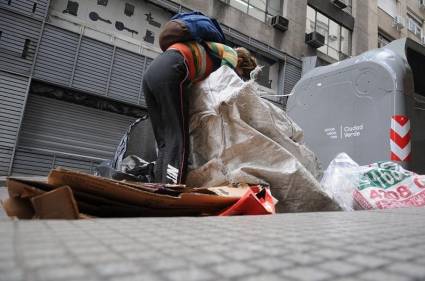
Repeated devaluations, rising inflation, stagnation, rising unemployment and adjustment measures agreed with the IMF explain the deterioration of the Argentine economy under Macri. Poverty affects 16 million people and the national industrial apparatus already completes a period of 18 consecutive months in decline. Author: Page 12 Published: 07/12/2019 | 07:41 pm
A decision announced a priori brings about the purposes Alberto Fernandez has in his portfolio for when he is sworn in as president. Within two days: Argentina is not going to accept the last pull of the scandalous $56 billion that Mauricio Macri sought from the IMF, It has been the largest loan granted by that institution in all its history. Nor will it negotiate more loans.
His will be a term that will be born under that Sword of Damocles, because the strong indebtedness agreed by Macri will still continue to hover over the country for some time. But Fernández will not allow the overruns with which the Fund manages the Governments to overfly it. No more recipes.
That is what would happen if the new president accepted the possibility – outlined recently by officials of the IMF – of signing another agreement for the country to receive more money lent to “help” – say the IMF officials – to pay what is owed …
Fernandez won’t do it. In the weeks since his election, he has reiterated the same idea: the country will not pay until the economy reactivates and grows.
With this conviction, he faced his first dialogue with the new head of the IMF, Kristalina Georgieva. She asked him, a few days ago, to apply policies of “fiscal viability” that allow the nation to pay off the debts contracted by the outgoing president.
The president-elect remained at “his 13” [stuck to his guns]. His administration, Fernández replied, will propose “a sustainable economic plan” and there will be no more fiscal “adjustments.”
However, Argentina has no choice but to pay, probably through renegotiation.
The new government – he has also reiterated this – will not declare Argentina in default (cessation of payments). This would mean that all credit and investor doors would be closed and, in addition, there are commitments made with private debt holders. But the incoming executive also refuses to tighten people’s belts just to favor, as Mauricio Macri has done until today, the eternal circle of indebtedness.
Looking Back…
The situation seems unusual in its difficulty, although it is not new. It resembles too much that of Argentina in 2003, when the late former president Néstor Kirchner took over the helm of an equally indebted country. Perhaps then with more factories closed and more hunger, and the nation was the prey of a boiling up that brought the beaten middle class to the streets, put pot-banking in vogue, and pushed a president, Fernando de la Rúa, out of the Casa Rosada. Then, at the climax of the impossibility of maneuvering, the government was forced to freeze the money of savers in the banks and decreed the so-called “corralito financiero” (financial corral).
Those spontaneous mobilizations were the result of several administrations as rabidly and ruthlessly neo-liberal as the one Macri is now concluding. He has also been repudiated in the streets by those who come back from the same evils, and even by those who did not experience them before but suffer them now.
Somehow, Macri has also been taken out of the house of government by the people, only “for the better”. The electoral outcome that gave victory to the Front for All is due, in good measure, to its ability to unite its main protagonists to the strength of Peronism but also -and a lot!- to that popular rejection that gave its punishment vote to the outgoing administration.
If you look at the numbers, these four years may outweigh the critical times of the 1990s and early 2000s in depredation. If, when Nestor Kirchner arrived, Argentina’s debt was around $170 billion dollars, last June external debts were at $283.567 billion: $7.819 billion more than a quarter ago, according to data from the National Statistics Institute cited in Argentine reports. That figure represents 80 percent of GDP! Almost the same as the country produces, because it has been in recession for three years.
The times for the cabinet of Alberto Fernandez are shortened if you take into account that for 2021 they will face payment deadlines of $38 billion of capital, and $16 billion in interest.
Kirchner, at the time, paid the Fund once and for all. He renegotiated with private bondholders, in transactions that meant important “removals” of Argentina’s debt.
Now is Alberto Fernandez time to act. How will he do it? How will he be allowed to do it? Because one observer has pointed out that the gendarmes of the Monetary Fund will react to the sovereign attitude of Alberto Fernandez, as dictated by the United States.
Deputies of the Popular Unity Party denounced the outgoing president in court for having indebted the country for more than $100 billion dollars, and the fact that $86 billion of them have fled.
Upon filing the complaint, Claudio Lozano and Jonatan Baldiviezo accused him of the crimes of non-compliance with his duties as a public official and abuse of authority,. They estimated that “if we do not suspend payments, the debt could choke Argentina’s recovery.”
Other debts
The weight of Macri’s external debt and the IMF’s persecution are not the only evils that the new government will have to fight economically.
An interesting article published in Página 12 by Alfredo Zaiat also points out the strong fiscal restrictions that have had to be implemented and will be against them. These include the exchange control implemented in the face of hit international reserves, weakened by the flight of foreign exchange; the weakened productive and labor scenario, the fall of the Argentine peso against the dollar (still at 63 to one) and the demands of trade and social sectors that have been hit hard by the crisis, such as teachers, scientists and state employees.
Fernandez knows where the core is to move the country forward. He hasn’t stopped working with a team of the Front for All since the good percentages obtained by his candidacy. With Cristina as vice-president, he announced that he would be the new head of state.
He has met with the provincial governors to ask for their support and also to demonstrate that he will govern by listening and counting on them. He has also spoken slowly with businessmen and industrialists, who have equally been hit by the macro crisis, to whom he gave guarantees of reactivation and asked for support.
The new government wants to return the workers’ salaries which had beenand fatten a little the slim pensions of the retirees; that there is no more need for soup kitchens, to improve access to education and health… And it has announced emerging social plans to alleviate that other macro debt: the one contracted with society.
The decision to incorporate two new ministries into the cabinet: Gender and Equity, and Habitat and Housing, illustrates where their paths go. This can also be seen in the announced Argentina program against hunger, and other social plans that will seek to provide a basic food basket to vulnerable households, and to guarantee potable water…
Those aspirations are a sign of how much citizenship needs. And the performance in the economic sphere on which many will depend; there everything is decided for Argentina today… or almost everything.
Alberto Fernández’s text, December 10, 2019
The Full Text of Alberto Fernández‘s speech to the Legislative Assembly
December 10, 2019.
Translated and edited by Walter Lippmann for CubaNews
Madam Vice-President,
Deputies and Senators
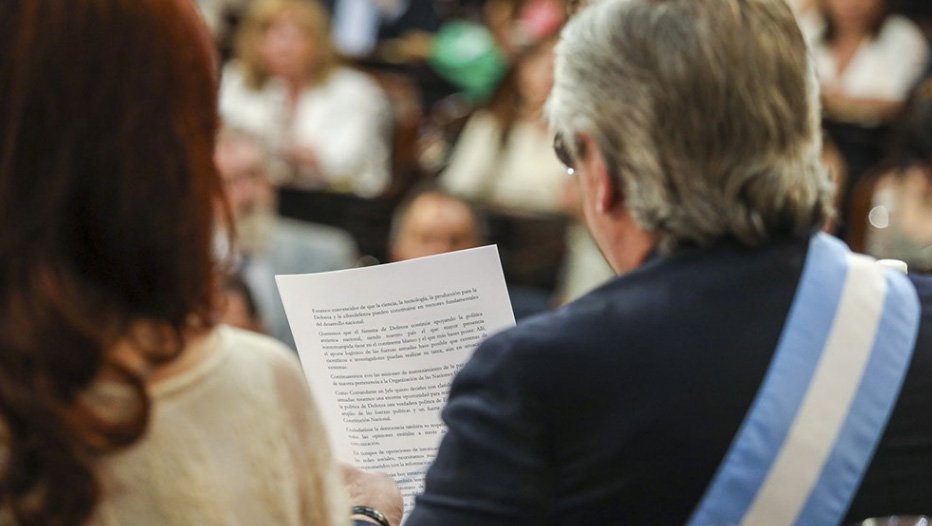
Dear Argentinean People,
The 10th of December each year is no ordinary day in our collective memory.
Today we celebrate the moment when Argentina buried the cruelest of the dictatorships we have had to endure. That day, thirty-six years ago, Raúl Alfonsín assumed the Presidency. He opened a door for us to respect the plurality of ideas and gave us back the institutionality that we had lost.
Since then, our country has gone through different moments. Some more placid and happy and others more sad and tumultuous. But in any case, we always persevered in the institutionality and any crisis that presented itself to us we knew how to bear it while preserving the functioning of the republic.
We Argentines have learned that the weaknesses and inadequacies of democracy can only be resolved with more democracy. That is why today I would like to begin by indicating my democratic commitment that guarantees among all Argentines, beyond their ideologies, coexistence in respect for dissent.
I wish to address very personally each and every one of those Argentines who inhabit this homeland.
I do so before the representatives of this Legislative Assembly, the authorities of the entire international community who are visiting us today and the various expressions of our life in society.
I do not want to use worn-out or artificial phrases.
I would like my words to express, as faithfully as possible, the echo of millions of voices that still resonate throughout Argentina.
From the humility of those listening, and from the hope that millions of compatriots expressed in the ballot boxes last October 27, I come to call for the unity of all of Argentina in pursuit of the construction of a New Contract of Social Citizenship.
A social contract that is Fraternal and Solidary.
Fraternal, because the time has come to embrace the different.
Solidary, because in this social emergency, it is time to start with the last ones, and then to be able to reach everyone.
This is the spirit of the time that we inaugurate today.
With sobriety in words and expressiveness in deeds.
I come to summon you, without distinction, to put Argentina on its feet. So that it may begin to walk. Step by step. With dignity. Towards development with social justice.
Today more than ever, it is necessary to put Argentina on its feet as a necessary condition for it to walk again. This means, first of all, recovering a set of social, economic and productive balances that we do not have today.
It’s time to give up the shock.
Be aware that the deep wounds that we suffer today need, to begin to heal, of time, peace, and, above all, of humanity.
I would like to call upon this United Argentina to unfold a new vision of humanity that reconstructs the essential links between each one of us.
That is why I need to share with you the conviction that I feel at this moment about the great walls that we have to overcome in order to put Argentina on its feet.
We must overcome the wall of resentment and hatred among Argentines.
We have to overcome the wall of hunger that leaves millions of men and women outside the table that is common to us.
And, finally, we have to overcome the wall of the waste of our productive energies.
These walls, and not our different ideas, are what divide us in this historical time.
That is why I would like these words not to be a monologue, but an invitation to a profound and sincere reflection on this transcendental moment.
Overcoming emotional walls means that we are all capable of living together in difference and that we recognize that there is no one left in our Nation, neither in their opinion, nor in their ideas, nor in their manifestations.
We have to suture too many open wounds in our homeland. Betting on the fracture and the crack means betting that those wounds will continue to bleed. To act in this way would be the same as pushing us into the abyss.
I express it from the heart, both to those who voted for me and to those who did not. Do not count on me to continue on the path of disagreement.
I want to be the President capable of discovering the best side of those who think differently from me. And I want to be the first to live with him without piercing his failings.
I want to be able to correct my mistakes, instead of placing myself on the pedestal of an enlightened one.
I come to invite you to build that democratic society.
The dream of a united Argentina does not need unanimity. Much less uniformity. In order to achieve the dream of a positive coexistence among Argentines, we start from the premise that all truth is relative. “Perhaps the sum or the confrontation of these truths will enable us to achieve a surpassing truth,” Néstor Kirchner wisely said.
In saying this, I am not unaware that the conflicts we face express distributive interests and bids.
But I am also aware that, if we act in good faith, we may be able to identify very urgent and shared priorities and then agree on mechanisms to overcome those contradictions.
Beyond the differences, I am sure that all of us agree that to begin to overcome the wall of fractures in Argentina implies creating an ethic of priorities and emergencies.
Beginning with the last ones, to reach everyone.
More than 15 million people suffer from food insecurity in a country that is one of the largest food producers in the world.
We need all of United Argentina to put a stop to this social catastrophe. One out of every two children is poor in our country.
Without bread there is no present and no future. Without bread, life suffers only. Without bread there is no democracy or freedom.
That is why the first official meeting of our Government will consist of a working meeting on this priority, the Integral Plan Argentina Contra el Hambre (Argentina Against Hunger). There, all our cabinet and the personalities of the civil society that have generously joined our call, will begin the action that will put an end to this painful present.
But I would not be sincere before you if I did not share another conviction: the marginalized and excluded of our homeland, those affected by the culture of discard, not only need us to rush a piece of bread to the foot of our table. You need to be part of it and to be diners at the same table. From the big table of a Nation that has to be our “common house”.
This requires us to reorient priorities in our economy and in our productive structure.
Solidarity in the emergency has many faces.
Family economies are suffocated by high levels of indebtedness, at usurious rates and in some cases with daily repayment schemes.
Today, our compatriots have taken out loans to buy food and medicines or to pay utility bills. Grandmothers and grandfathers went into debt to buy medicines and began to eat less and worse.
The SME situation also has dramatic proportions, requiring fiscal relief and appropriate stimuli.
The idle capacity of our factories, industries and businesses is also a waste of productive energy.
We want a present state, a builder of social justice, that gives air to family economies: that’s why we’re going to implement a massive system of non-bank loans that provide loans at low rates.
The popular economy and its organized movements, cooperativism and family agriculture will also be central actors in these public policies.
The culture of work is guaranteed by creating formal jobs with all the benefits of social security. That is why we will put in place actions that will make it easier for all the holders of the complementary social wage to insert themselves in the world of work and to receive payment for their work.
Today, unemployment affects almost 30% of young people and, even at higher rates, young women. There are more than 1,200,000 young people who neither study nor work. We must guarantee the right to first employment, through scholarships provided by the State for young people to train and work in companies, SMEs, social organizations and the popular economy and family farming.
The idea of a New Contract of Social Citizenship supposes to unite wills and to articulate the State with the political forces, the productive sectors, the confederations of workers, the social movements, that include feminism, youth, environmentalism. We are going to add to this the scientific-technological framework and the academic sectors.
I am sure we will all agree that we have reached this situation because very bad economic policies have been implemented. This series of economic decisions were decisive for the Argentine people, for the most part, to disqualify them in the last elections.
From the fidelity to this popular mandate, we are going to promote a set of economic and social measures of a different nature, which will begin to reverse the structural course of social and productive backwardness.
In the next few days we will be calling on workers, employers and various social expressions to implement a set of Basic Emergency Solidarity Agreements, which will constitute the solid foundation from which to restart the engines of our economy.
In this call, we will be proposing a series of measures to re-establish the indispensable macro-economic, social and productive balances so that Argentina can turn itself on and walk again.
We know that we will be walking a narrow, complex, challenging path, where there is no room for either magical dogmas or sectarian bids.
I would be lacking in truth and responsibility if I did not share with you the exact scenario in which we are assuming today. It has conclusive figures and data, emanating from the outgoing administration. And it is the indispensable information to understand the challenges that we will have to take on as a society.
If I didn’t do this, I couldn’t explain why it’s going to take some time to achieve what we all want.
Our current inflation is the highest in 28 years. Since 1991, Argentina did not have an inflation rate of more than 50%.
The unemployment rate is the highest since 2006.
The value of the dollar went from $9 to $63 in just four years.
Argentina continues to shrink its economy. The 2019 GDP is the lowest in the last decade.
Current poverty is at its highest level since 2008. We went back more than ten years in the fight to reduce poverty.
GDP per capita is the lowest since 2009.
External debt in relation to GDP is at its worst since 2004.
The current indigence [poverty] is at its highest level since 2008.
The level of industrial production today is equivalent to that of 2006: we went backwards 13 years.
Registered industrial employment is at the 2009 level.
The number of companies is equivalent to the level registered in 2007: we went backward 12 years. We closed 20,000 companies in 4 years. Of these, 4,229 were industrial companies.
The industrial GDP fell by 12.9%, comparing the first semester of 2019 against the same period of 2015. 23 of the 24 branches of industry lowered their level of activity in 2018 compared to 2015.
In these 4 years, more than 141,000 registered private sector jobs were lost in industry.
In inter-annual terms, the registered industrial employment has been destroyed for 42 consecutive months.
Behind these terrifying numbers, there are human beings with decimated expectations.
We have to say it with all the letters: the economy and the social fabric are today in a state of extreme fragility, as a product of this adventure that led to the flight of capital, destroyed industry and overwhelmed Argentine families.
Instead of generating dynamism, we have moved from stagnation to free fall.
In this context, I have decided that we will not give parliamentary treatment to the National Budget projected by the outgoing government for 2020. Their numbers reflect neither the macroeconomic reality, nor the social realities, nor the debt commitments that have actually been assumed.
An adequate budget can only be projected once the instance of negotiation of our debts has been completed and, at the same time, we have been able to put into practice a set of measures to compensate for the effect of the crisis on the real economy.
The Nation is indebted, with a mantle of instability that rejects any possibility of development and leaves the country hostage to the international financial markets.
We have to avoid that scenario. In order to put Argentina on its feet, the project must be our own and implemented by us, not dictated by anyone from outside with the same old recipes that have always failed.
The Argentina we seek to build is an Argentina that grows and is inclusive. An Argentina where there are incentives to produce and not to speculate.
An Argentina with a vision of a National Development Project, in which agro-industry, manufacturing industry, knowledge-based services, SMEs, regional economies and the set of productive activities are capable of adding value to our raw materials for export and to strengthen a robust domestic market.
Therefore, the Basic Emergency Solidarity Agreements will be the starting point to stop the free fall of the situation we are receiving. We will come out of this situation with consensus and in a gradual and sustained manner.
It is fundamental to recover the economy. An orderly macro-economy is a necessary condition to allow room for the creativity of development policies. There can be no progress without economic order.
To reorder the economy we need to get out of the logic of more adjustment, more recession and more debt that has been imposed in the four years that end today. In this reordering action, we are going to protect the most vulnerable sectors.
In the present that we face, the only privileged will be those who have been trapped in the pit of poverty and marginalization.
We need to relieve the burden of debt in order to change reality. We must redevelop a productive economy that allows us to export and thus generate capacity to pay.
I want all of us to understand that the government that has just finished its term has left the country in a situation of virtual default. At times I feel like I am going through the same labyrinth that trapped us in 2003 and from which we were able to emerge with the effort of the whole society.
Our plan of Basic Agreements of Solidarity in the Emergency, seeks to resolve this situation of disorder, to give economic and social consistency to our recovery.
The integral consistency of what we propose in terms of all the variables of the plan -prices, salaries, tariffs, exchange rates, monetary, fiscal and social aspects- will be made explicit in the coming days, calling on all the sectors involved.
I appeal to the responsibility and patriotism of all.
We are receiving a country that is fragile, prostrate and hurting.
It is time for a shared vocation that seeks a country that offers a better destiny to all.
The macro-economic plan that we pursue is a central but not isolated piece of a National Development Project that includes multiple interrelated areas. We are going to work simultaneously on new axes to transform our productive structure, with active policies that take into account the vertiginous [dizzying] technological change we are facing, the inter-relationship between industries, natural resources and services.
We are going to face the problem of external debt. There are no debt payments that can be sustained if the country does not grow. It’s ass simple as that: in order to be able to pay, you have to grow.
We will seek a constructive and cooperative relationship with the International Monetary Fund and with our creditors. Solving the problem of an unsustainable debt that Argentina has today is not a question of winning a dispute against anyone. The country has the will to pay, but lacks the capacity to do so.
The outgoing government took on an immense debt without generating more production with which to obtain the essential dollars to pay it. Creditors took a risk by investing in a model that has failed around the world time and time again. We want to solve the problem and for that, we need all parties to work responsibly.
We are not going to repeat the sad story of reckless technical missions that promise plans they cannot fulfill and make decisions that end up compromising the destiny of millions of Argentines.
Seriousness in the analysis and responsibility in the commitments that are assumed so that the weakest stop suffering. Under these premises, we will take over all negotiations of our debt.
There is another basic balance that we have to build: the federal and territorial balance.
Argentina needs to put an end to a structure that shows a rich and thriving “central” country and a “peripheral” country. One that seeks to develop from the minimum concessions that the “central” country gives. There can be no first-tier Argentines and second-tier Argentines. Argentina is only one, and together it must tend to the development of each and every one of its regions. That is the challenge we face and we must overcome.
We are going to implement these Basic Emergency Solidarity Agreements with the participation of Governors from all over the country, with an innovative federal criterion, in a productive and social key, beyond what is merely fiscal.
We will take a substantial part of the political and administrative activity of the National State to the provinces, creating alternative capitals. In this way, the reality of those places in our homeland can become alive to the policymakers, in the media and to acquire, in turn, the visibility that they did not have for decades.
We will also carry out an exhaustive analysis in order to decentralize and/or relocate Federal State agencies in the different provinces.
Just as the National Institute of Viticulture now operates in the Province of Mendoza and the National Institute of Fishing Research and Development operates in the City of Mar del Plata, we must think of diverse alternatives that guarantee a new federalism.
We are going to put Argentina on its feet, with a quality, sustainable and sustainable federal infrastructure, promoting regional development and together creating thousands of jobs in service cooperatives, small and large enterprises.
We are going to deploy throughout the country a Public Works Reactivation Plan, which are associated with the ecological challenge and allow us to improve an eco-system of environmental, social and productive relations.
They will be projects for fast execution and with great use of local people, destined to improve road safety and the accessibility, urban and territorial ordering, construction and maintenance of public buildings and the hydraulic infrastructure, among others.
Our commitment is to ensure absolute transparency in the administration of resources allocated to public works. The citizens will be able to access all the information about the project of the work, the costs of the same, process of bidding and selection of the executing company, to monitor the advances and to denounce irregularities.
We will develop an ambitious plan to regularize habitat and housing construction. It is inadmissible to think that in the 21st century millions of Argentines do not have a roof under which to shelter. The new Ministry of Habitat and Housing has been instituted with the purpose of addressing these shortcomings.
We are going to take care of the health of Argentines through the Ministry that they once degraded. The inattention that health in Argentina has suffered in recent years is evident. Diseases that we thought had been banished have reappeared among us. From now on, we will settle the pertinent measures so that our children are vaccinated in time and form. In that way, in the hospitals there is no lack of supplies and the remedies reach our grandparents with less income free of charge.
All these challenges must be met in a convulsed international context. Argentina must not isolate itself and must integrate itself into globalization. But it must do so intelligently, preserving national production and labor.
We want a dynamic commercial diplomacy that is politically innovative. That is why, in the area of international relations, we will set in motion a plural and global integration.
Plural, because Argentina is a land of friendship and mature relations with all countries.
Global, because that integration is with the world and with the local at the same time. An Argentina inserted in globalization, but with roots in our national interests. No more and no less than all the developed countries that promote the well-being of their inhabitants.
Our Ministry of Foreign Affairs will be focused on conquering new markets, motorizing exports, generating an active productive promotion of foreign direct investments, which contribute to modify technological processes and generate employment.
In this globalization, we also feel that Latin America is our “common home”.
We are going to strengthen MERCOSUR and regional integration, in continuity with the process initiated in 1983 and enhanced since 2003.
With the Federative Republic of Brazil, in particular, we have to build an ambitious, innovative and creative agenda, technologically, productively and strategically, one that is supported by the historical brotherhood of our Peoples and that goes beyond any personal difference of those who govern the situation.
We are going to honor it, we are going to advance together in the construction of a future of shared progress.
We continue betting on a united Latin America, to insert ourselves successfully and with dignity in the world. In 1974, General Juan Domingo Perón pointed out that “at the national level, no one can be fulfilled in a country that is not fulfilled. In the same way, at the continental level, no country can be realized in a continent that is not realized.
We know that this is a highly complex world. With serious economic problems and imbalances. Authoritarian movements have grown in several countries, there have been coups d’état and at the same time in several countries, there are growing citizen demands against neo-liberalism and social inequality.
In any scenario, Argentina will raise high its principles of peace, of defense of democracy, of full validity of human rights. We will defend the freedom and autonomy of peoples to decide their own destinies.
We reaffirm our firm commitment to the fulfillment of the 1st Transitory Clause of the National Constitution and we will work tirelessly to promote “…the legitimate and imprescriptible demandd for sovereignty over the Malvinas Islands, South Georgia and the South Sandwich Islands and the corresponding maritime and insular spaces…”.
We will do so knowing that we are accompanied by the peoples of Latin America and the world and convinced that the only possible path is that of peace and diplomacy. We will honor the memory of those who fell in the struggle for sovereignty. We will do so by working for the peaceful resolution of the dispute and on the basis of the dialogue proposed in United Nations Resolution 2065.
There is no more room for colonialism in the 21st century.
We know that for this task it is not enough to have the mandate of a President, or of a Government. It requires a medium- and long-term state policy. That is why I will convene a Council in the presidential orbit where all the political forces, the Province of Tierra del Fuego, representatives of the academic world and the ex-combatants will participate. Its objective will be to forge a national consensus to design and carry out the strategies that will allow the claim to be successfully carried out beyond the electoral calendars.
We will defend our sovereign rights over the Malvinas Islands, the continental shelf, Argentine Antarctica and the natural resources that these extensions possess because they belong to all Argentines.
Argentina needs an active environmental policy that promotes a transition towards a model of sustainable development, responsible consumption and valuation of natural goods.
In this search we are inspired by the Encyclical “Laudato Si” of our beloved Pope Francisco, a universal ethical and ecological Magna Carta. That is why we have taken the first decision to prioritize the environmental area as a Ministry.
We reaffirm our commitment to the Paris Agreement, promoting integral and sustainable development through a just transition that ensures that no one is left behind. These measures are essential to address the country’s vulnerabilities, particularly those of the most vulnerable sectors, which suffer most from the effects of Climate Change. We need to order the conditions for the conservation and rational use of environmental resources, forests and biodiversity, wetlands and soils, the sea and its resources.
Dear Argentines, dear Argentines:
Simultaneously with solidarity in the emergency, in the coming days, we will be sending Parliament the legislative bases to institutionalize an Economic and Social Council for Development, which will be the permanent body to design, agree and enshrine a set of State policies for the next decade.
We will give it legislative status and we will propose that its highest authorities be elected by parliamentary agreement, for a period of management that goes beyond our mandate.
We intend that in this plural scope the great institutional and productive pillars of medium and long term are designed -without circumstantial discussions-, towards an integral and inclusive human development.
We hope that this Council will open informed debates, with scientific evidence, with creative participation, with the help of technicians and professionals from all over Argentina who can inspire the construction of different directions.
We know that our country does not stand out for having had state policies. Since 1983 there have been only two constants. The irrevocable decision to live in a democratic society and the will to integrate regionally.
We have the responsibility to assume as State policies other irrevocable moral imperatives of Argentine society. Since 1983, society has worked for the Never Again for State Terrorism, to achieve Memory, Truth and Justice. The first advances were achieved since 1983 and then many others were resumed since 2003. And any regression in this matter was collectively prevented. We are proud as a society to have today Armed Forces committed to democracy.
Today is International Human Rights Day. And today, once again, Argentina commits itself to the respect of human rights and to raise that commitment as an unyielding flag in any country in the world.
Improving the quality of human and civic rights also implies overcoming this poor institutional quality in which we live.
It is time to citizenize democracy. We have a democracy with pending accounts and I feel that I express to a generation that arrives at this hour to the power to take the decision to settle them.
A democracy without truly independent justice is not democracy.
A classic criminalist knew how to say that when politics enters the Courts, justice escapes through the window.
Without a justice independent of political power, there is no republic or democracy. There is only one corporation of judges attentive to satisfy the desire of the powerful and to punish without reason those who confront them.
We have seen the judicial deterioration in recent years. We have seen undue persecution and arbitrary detentions induced by the rulers and silenced by a certain media complacency.
That is why today I come to demonstrate before this Assembly and before all the Argentine People, a resounding Never Again.
Never Again to a justice contaminated by intelligence services, “judicial operators”, obscure procedures and media lynchings.
Never again to a justice that decides and pursues according to the political winds of the power in turn.
Never again a justice that is used to settle political discussions, nor a policy that judicializes dissents to eliminate the adversary in turn.
I say this with the firmness of a profound decision: Never again is never again.
Because a delayed and manipulated justice means a harassed and denied democracy.
We want an Argentina where the Constitution and the laws are strictly respected. We want there to be no impunity, neither for a corrupt official, nor for those who corrupt him, nor for anyone who violates the laws. No citizen, no matter how powerful, is exempt from equality before the law. And no citizen, no matter how powerful, can establish that another is guilty if there is no due process and no final judicial conviction.
When the guilt of a person without a judicial conviction is assumed, not only the Constitution but also the most elementary principles of the rule of law are being violated.
In order to overcome this wall, the only thing that has been guaranteed in Argentina is structural impunity, in the coming days we are going to send to Parliament a set of laws that enshrine a comprehensive reform of the federal justice system.
At the same time, we will be reorganizing and concentrating the efforts of the justice system so that the investigation of organized crime, complex crime, drug trafficking and drugs, which are scourges that we must tackle in a systemic manner, can be emphasized effectively and transparently.
It is a question of taking advantage of the valuable and majority resources that exist today in our justice system, in order to put an end to the ominous stain that a minority sector causes to the credibility of the institutions.
In the same sense of profound transformation, I have decided that the Federal Intelligence Agency will be intervened in order to promote a restructuring of the entire intelligence and strategic information system of the State.
As an immediate step, I will revoke Decree 656 of 2016, which was one of the first and painful measures promoted by the previous administration and which meant consecrating the secrecy for the use of funds reserved by State intelligence agents.
Within the framework of the repeal of that measure, which was a regrettable institutional setback, I have also taken another decision: these reserved funds will not only cease to be secret, but will also be reallocated to finance the budget of the Hunger Plan in Argentina.
We will do the same with the rest of the reserved funds that the current national budget foresees today for the other armed and security forces, which will be maintained as such to the indispensable extent, only when very strict defense and security needs demand it, and always with a maximum level of parliamentary control.
I say this and I reiterate with the firmness of a deep conviction.
Never again to the secret state.
Never again to the darkness that shatters confidence.
Never again to the basements of democracy.
Never again is never again.
In this context, I would also like to announce that in the coming weeks we will be sending to Parliament and submitting to the informed debate of civil society and experts throughout the country a proposal for the transformation and structural coordination of the entire policy on citizen security and the prevention of violence.
We hope that it will be not only a state policy but also a societal policy. Concerted, plural, integral and co-managed, beyond the term of our mandate, among all the actors of the political system. To avoid dangerous pendulums that only call into question the credibility of institutions.
We want to put Argentina on its feet. Our armed forces must also be included in this objective.
For that they have to be qualified and equipped, enlisted and trained, for the fulfillment of the main mission and the secondary missions.
We want an autonomous, defensive and cooperative defense policy, articulating mainly with the countries of the region, with whom we no longer have a conflict hypothesis.
We are convinced that science, technology, defense production and cyber-defense can become fundamental vectors of national development.
We want the Defense System to continue supporting the national Antarctic policy, being our country the one with the greatest uninterrupted presence in the white continent and the one with the most bases. There, the logistical contribution of the armed forces makes it possible for hundreds of scientists and researchers to carry out their tasks, even in extreme situations.
We will continue with peacekeeping missions within the framework of our membership in the United Nations.
As Commander-in-Chief, I want to say clearly to our armed forces: we have an enormous opportunity to look to the future and make defense policy a true State policy, with a broad consensus of the political forces and a strong commitment to our National Constitution.
Citizenizing democracy also means respecting freedom of expression and all opinions expressed through the mass media.
In times of intoxication operations with false news through social networks, we need more than ever a vibrant media, committed to quality information.
The media are today immersed in an exponential technological change that, by challenging them, also challenges our democracy. Our Government assumes the commitment to accompany them independently in this transition. And to consolidate them as a great knowledge industry.
In this dimension of full respect, we are going to call for a better institutional quality in our relationship with the journalistic media, through the reformulation of what has been until now the handling of the State’s advertising guidelines.
The administration that ended today, spent a total of $9 billion pesos in official propaganda.
AState propaganda nonsense, in a country with a hunger for bread and a hunger for knowledge.
We want a press that is independent of power and independent of the resources that bind it to power.
For this reason, we are going to reorient the advertising budget of the State under other criteria.
We want them to stop serving the propaganda of the State so that they serve to improve the quality of education.
We are not going to cut this immense figure in its entirety, because it would affect the business movement of our journalistic media. But we are going to reorient it.
We want the ads paid for by our government, instead of advertising, to contribute to improving the learning process of our young people.
So that the mathematics, history, literature, physics and sciences of our school curricula can be taught in a more effective and creative way, through contents that are developed and disseminated by the advertising campaign that is set in motion with the resources of the State.
We do not want paid advertisements with everyone’s money to praise the kindness of the government in office.
We will invest the official advertising budget to publish advertisements in the media that will be pedagogical tools, which will help us improve the educational performance of our young people throughout the country.
We have to put these resources at the service of dictation of content more accessible and more adapted to modern demands.
In the coming weeks, we will be convening journalistic institutions throughout the country, to join with their talent to this proposal and commit together with teachers, scientists, pedagogues and experts in education, under the slogan of improving the quality of education.
The State media system -radio, television, news agencies, cultural spaces- will also contribute to this priority purpose. More and better education for all.
And we are also going to promote that all the jurisdictions and the other Powers of the State of the country, with a federal criterion, join in this purpose.
There will be no state guidelines for funding individual journalist programs. It will only be destined to journalistic institutions. In the relationship with journalists, the phrase that “clear accounts preserve friendship and respect” makes more sense than ever.
In the same context of innovation, we are going to propose a Great School of Government, with the highest academic excellence, as the axis of a process of professionalization, merit and administrative career within the framework of the National State.
We promote all these decisions because we understand that a New Contract of Social Citizenship implies to set in motion an educational, scientific and technological feat. As Arturo Frondizi once said, we must launch ourselves “with determination and courage to conquer the future”.
We will make every effort to universalize early childhood education, so that all our girls and boys, from 45 days to 5 years old, learn, play and live together in this fundamental space for their future as people and for our future as a nation, which is the school.
We will not rest until a child in a rural area has the same access to a transformative education as a girl in an urban center, living in the point of the country she lives in. Today there are regions where 3 out of every 10 boys do not start school before the age of 5 and others where half do not before the age of 4.
We will also make it a priority to make progress in extending the school day, a fundamental initiative to break down inequalities of origin. We will start with schools attended by girls, boys and young people from sectors that need the State most, who can no longer wait.
None of this will be possible if we do not value the most important part of this dream we have in our hands: we want every teacher to want to be the educators of the future, the engine of change and transformation of our society. Improving working conditions and ensuring initial and ongoing training must be a priority.
During my government we will lay the foundations for a great National Education Pact, with all the actors of the educational community and society.
And this is not the dead letter of a speech.
Argentina became valuable when Alberdi and Sarmiento worked to make education public. It became rich with the University Reform. It became more powerful when Justicialism [Peronism] declared free university education.
We demand scientific and technological research because no country will be able to develop without generating knowledge and without facilitating the access of knowledge by the whole society. I have decided that in our Government the respective area will recover its Ministerial hierarchy that it should never have lost.
Together with the organized workers’ movement, the backbone of the social agreement, we are also going to promote an essential strengthening of permanent training for present and future jobs. We want technological change to have a soul, to be at the service of living well, to multiply productivity, inclusion and equity.
I do not want to end without mentioning emphatically that in the next four years I will make every effort to ensure that women’s rights are at the forefront. We will seek, through various instruments, to reduce gender, economic, political and cultural inequalities. We will place special emphasis on all issues related to care, the source of many inequalities, since most domestic work falls on women in Argentina as well as in other countries.
Not one Less must be a flag of all society and of all the powers of the republic. The State must drastically reduce violence against women until it is completely eradicated.
In Argentina, too, there is much suffering due to stereotypes, stigmas, the way of dressing, skin color, ethnic origin, gender or sexual orientation. We will embrace all those who are discriminated against. Because any human being, any one of us, can be discriminated against for what we are, for what we do, for what we think. And that discrimination must become unforgivable.
Our political ethics affirms the values of solidarity and justice. All Argentines are affected by the crisis. I would also like to address a moment to those who are in a better economic situation. To the Argentines who, because of their effort or for whatever reason, have a more pleasant situation.
In a context of extreme gravity, of emergency, we must understand that there is no possibility of asking sacrifices to those who are hungry, you can not ask sacrifices to those who can not make ends meet. We must address this situation with solidarity, so that when the economy is turned on, all sectors, without exception, can benefit. But until hunger is eliminated, we will ask for greater solidarity from those who have the greatest capacity to give it.
Begin with the last ones, to reach everyone.
And so, we propose an Argentina where the embrace grows, multiplies, because we need to unite. If we can stop the hatred, we can stop the fall of Argentina.
The first and foremost liberation as a country is to ensure that hatred has no power over our spirits. Let hatred not colonize us. Let hatred not mean a waste of our people living in community.
I would like to end by expressing my deep gratitude for the generosity and highlighting the strategic vision that our vice-president, Cristina Fernández de Kirchner, has expressed at this time in Argentina.
Allow me also to remember three people who signed me in life.
I would like to remind my mother that she marked me with her example.
I would like to remember Esteban Righi, who instilled in me like nobody else the best values of the Rule of Law.
And I want to remember Néstor Kirchner, who in 2003 allowed me to participate in the wonderful adventure of bringing Argentina out of its prostration.
I also want to thank all my comrades in the political space that has led us to victory, for their permanent dedication and militancy.
Many times in these days I have asked myself why I would like our government to be remembered in the future.
I would like us to be remembered for having been able to help bring the family table back together. May the logical and healthy political differences that can exist in a family be dialogued in peace and respect, without divisions or quarrels.
I would like us to be remembered for having been able to overcome the wound of hunger in Argentina, which is an insult to our collective project of living together.
I would like us to be remembered for having been able to overcome the perverse logic of an economy that revolves around productive disorganization, greed, speculation and infertility for the majority.
I would like us to leave a mark of having rebuilt the common house with a great national project, a Strategic Agreement for Development, of which we are proud.
That is why I hope that the final words of my first message as President of the whole of Argentina will not be an answer but a question.
Answers without questions are like trees without roots. And it is only in the encounter between questions and answers that our words take on real life.
Will we, like United Argentina, be able to dare to build this serene and possible utopia to which history calls us today?
Will we be capable as a society?
Will we be capable as leaders?
I want to be the President of listening, of dialogue, of agreement to build the country of all.
A few days ago, a friend of mine pointed out to me the importance of all of this in the coming future. He was right to say that we have to learn to listen to each other even though we do not think the same. Too long we tried the method of anger and rancor. We must all rid ourselves of the bitterness that we carry. Let’s regain each other’s trust. Let’s trust each other again.
The time has come. That is why I am here.
When my term ends, Argentina’s democracy will be in its 40th year of uninterrupted operation.
That day I wish I will be able to prove Raúl Alfonsín right.
I hope that together we can show that democracy cures, educates and eats.
Let us stand up and start our march again.
Thank you very much.
Facebook’s Intrusion into Argentina’s Elections

Facebook’s intrusion into Argentina’s elections unveiled
July 31, 2018
Translated and edited by Walter Lippmann for CubaNews.
An investigation by the British Parliament confirmed that the Facebook company conducted a secret campaign against Cristina Fernández de Kirchner in the 2015 presidential elections.
The report of the House of Commons Digital, Culture and Media Committee, entitled “Anti-Kirchner Campaign”, alludes to the existence of “alarming evidence” of Cambridge Analytica’s interference in the elections in the South American country.
The current president of Argentina, Mauricio Macri, won the presidential elections of November 2016, ending 12 years of Kirchnerist governments of Néstor Kirchner (2003-2007) and Cristina Fernández (2007-2015).
The campaign against the Argentine ex-president reportedly used “spy tactics”, “information warfare”, and “the use of retired officers from the intelligence and security agencies of Israel, the United Kingdom and Russia, in support of the British group’s mission of interference in Argentina”.
This, in addition to the manipulation of the data of at least 87 million Facebook users, and the use of fake accounts, both on that platform and on Twitter, with the aim of manipulating public opinion.
The UK Parliament expects the owner of the social network, Mark Zuckerberg, to return to the British legislature to answer questions he did not answer or answered with false information at his last appearance before the legislators.
Cambridge Analytica had already made the news about the illegal collection of information when it was revealed in March 2018 that it had had access to the account of more than 50 million users through Facebook, to support Donald Trump’s presidential campaign in 2016.
(With information from Telesur)
Subscribe to Blog via Email
| M | T | W | T | F | S | S |
|---|---|---|---|---|---|---|
| 1 | 2 | 3 | 4 | 5 | 6 | 7 |
| 8 | 9 | 10 | 11 | 12 | 13 | 14 |
| 15 | 16 | 17 | 18 | 19 | 20 | 21 |
| 22 | 23 | 24 | 25 | 26 | 27 | 28 |
| 29 | 30 | |||||

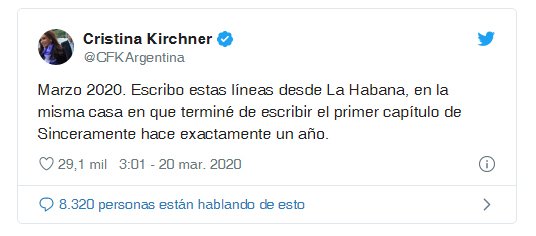
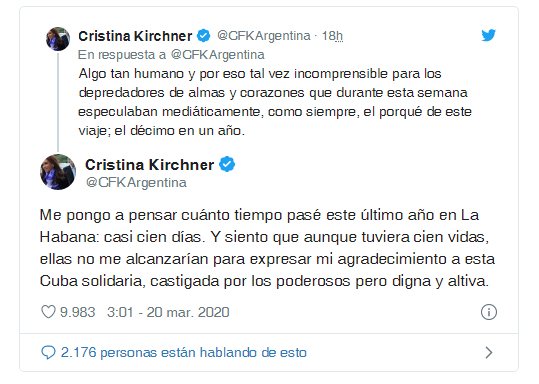
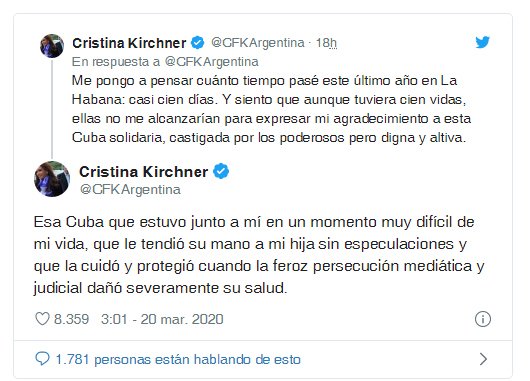
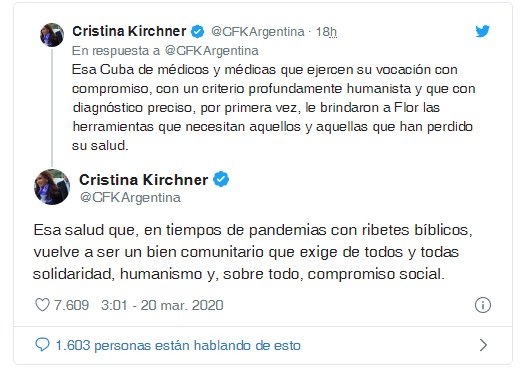
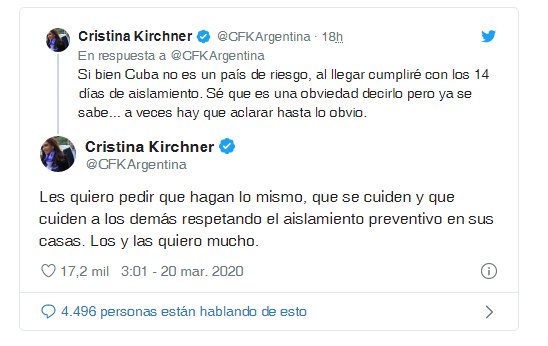

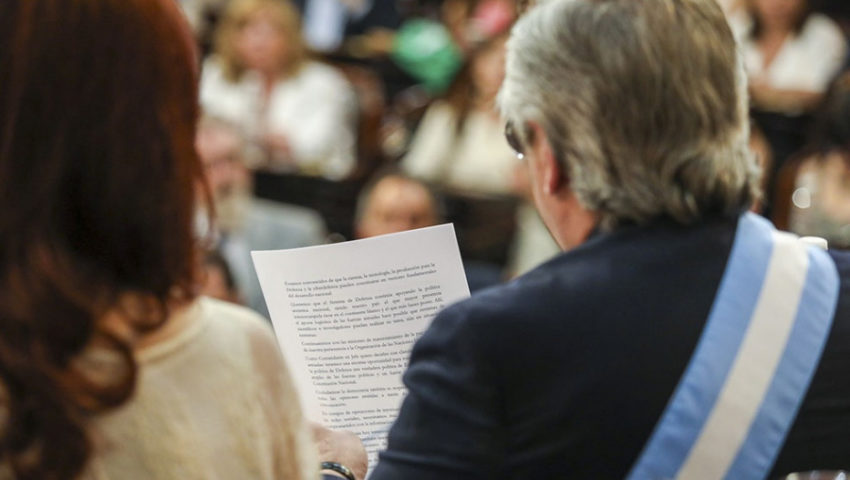
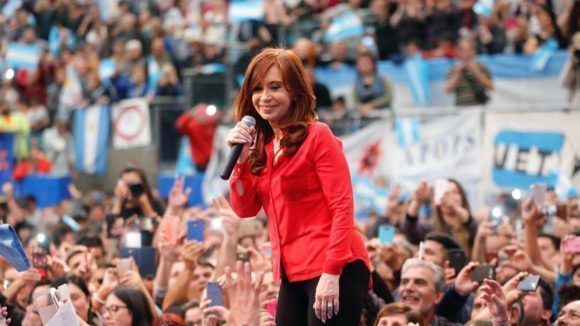
You must be logged in to post a comment.